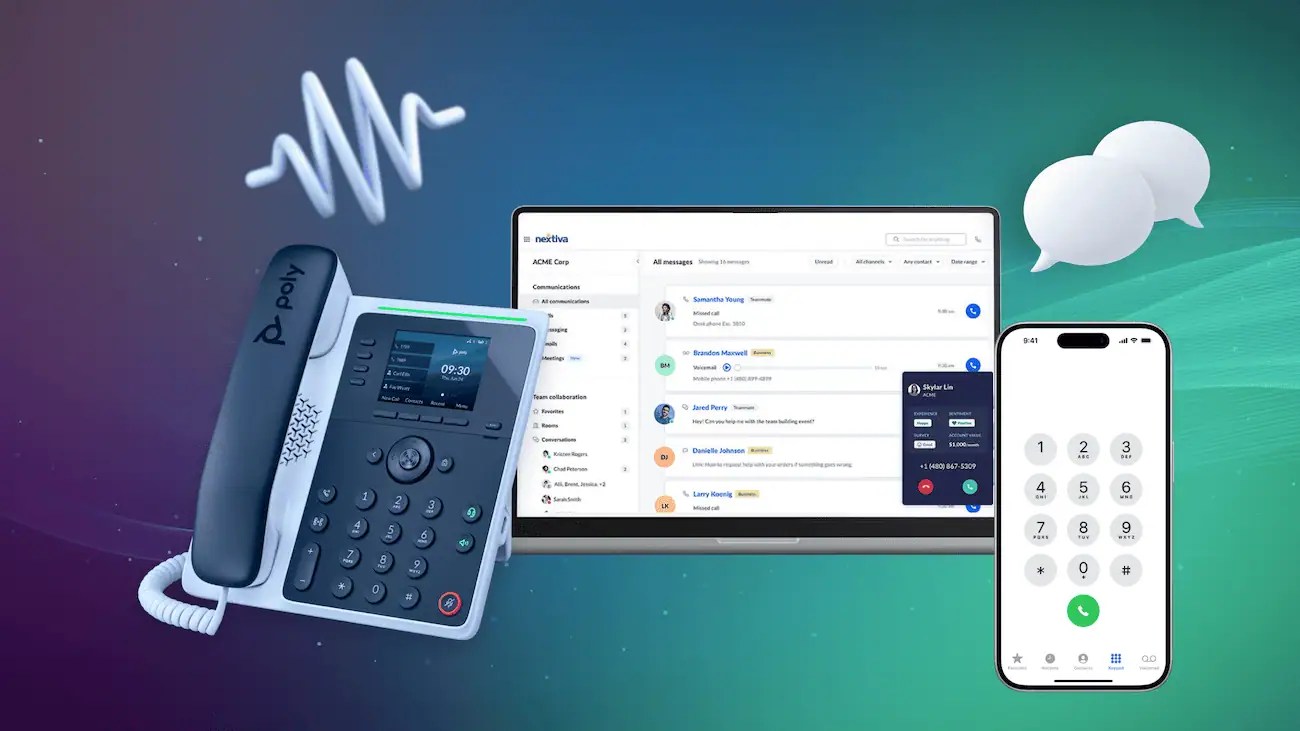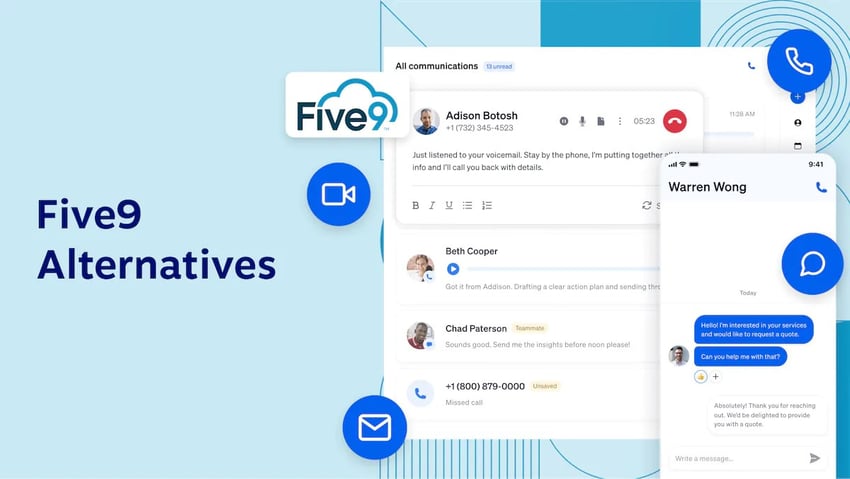Managing multiple landlines and toll-free numbers simultaneously isn’t easy for a small business. If you’re doing so without a unified system in place, you’re likely paying a lot more than you should. A voice over internet protocol (VoIP) software helps in such situations.
A VoIP phone system enables you to port existing landlines and toll-free numbers into a single interface, allowing for effective management of communications. You make and receive voice calls over the internet, which is cost-effective, as these services are offered at a flat price, and you don’t need to make heavy infrastructure investments. For further clarity, check out the VoIP cost details, but overall, a VoIP business phone system makes your life easier while saving you a lot of money.
What Is VoIP Software?
VoIP software allows you to make and receive voice calls using an internet connection instead of traditional phone lines. It converts your voice (which is analog audio) into digital data packets and transmits them over the internet to the call recipient, where the data is reassembled back into sound.
Since these signals are transmitted over the internet, you don’t have to invest in telephone cables or costly PBX hardware.
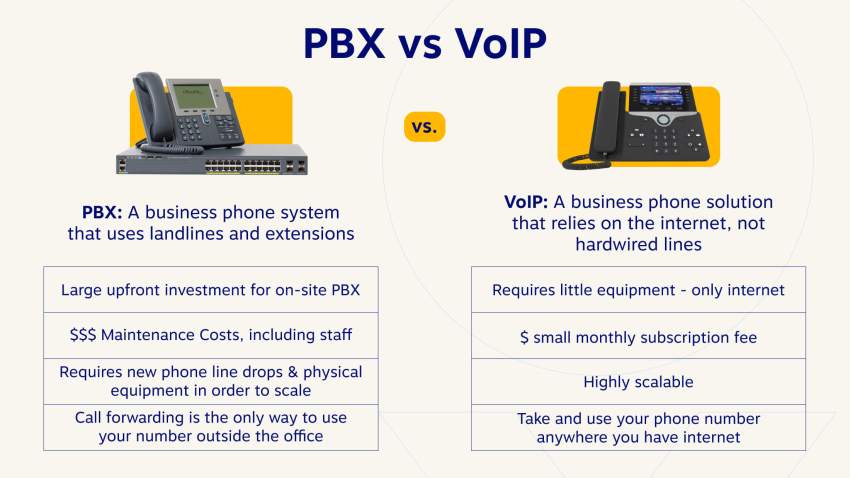
Modern systems support all-in-one communication and often include features like:
- Video conferencing: Provides high-quality video meetings and conference calls with screen sharing and webinar capabilities
- SMS/MMS messaging and team chat: Includes built-in text messaging, instant messaging, and persistent chat channels for internal teams
- Unified contacts and CRM integration: Delivers unified contact management tools or even integrated CRM systems that provide customer details during incoming calls
- Call analytics and monitoring: Facilitates real-time dashboards to monitor call volumes, durations, hold times, and more, along with features such as call recording for training purposes
All these features are delivered through a cloud-based platform, which serves as a single point of access that users leverage to simplify their workflow while ensuring that customers have the best experience.
How VoIP Software Works
At a basic level, a VoIP system converts voice signals into digital data and transmits them over a broadband internet connection. The system routes the calls through VoIP servers or the public switched telephone network (PSTN) when needed.

VoIP software allows you to make calls from desktop or mobile apps (Android and iOS), as well as web browsers and IP-enabled desk phones. Below are some components of VoIP software that play a crucial role in its processes and workflows:
- Softphone software: This provides a digital interface for making and receiving calls.
- SIP trunking or hosted PBX service: This will register your device, making it easier to route calls. It works similarly to your phone company, assigning you a VoIP phone number or SIP address and connecting calls between participants.
- Reliable internet connection: Call quality suffers if your network is congested, so ensure your network is capable of handling multiple VoIP calls simultaneously.
If you want to take a deep dive, learn more about 👇
Why Businesses Are Switching to VoIP
There are many reasons why businesses are considering VoIP solutions, including:
- Lower costs: You receive flat-rate pricing, often with unlimited usage in the US/Canada, as well as tiered plans and low international rates. Moreover, there’s no need for expensive PBX hardware or copper lines.
- High flexibility: VoIP makes your business number independent of device or location. It supports seamless remote work and hybrid office arrangements by enabling you to make or receive calls on a laptop, phone, tablet, or desktop IP phone.
- More features: There are numerous features, such as auto-attendant menus, voicemail-to-email transcription, call forwarding, and routing rules that cost-effectively cater to the communication needs of businesses.
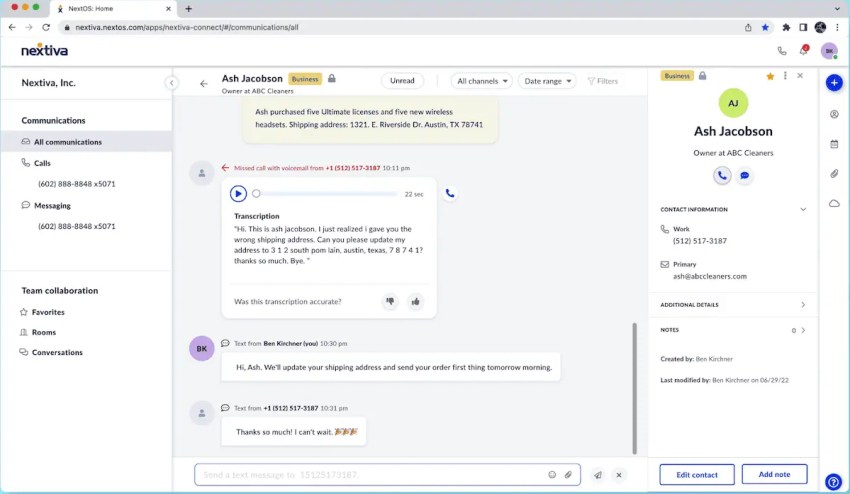
- Easy scaling: You no longer have to over-provision your phone system for future growth or peak seasons, meaning you can scale on demand. Because VoIP is software-based and delivered via the cloud, you can add or remove users/lines in minutes through an online dashboard.
- Better CX and insights: VoIP offers valuable insights into the customer experience by integrating with CRM systems, such as Salesforce or HubSpot. It provides you with more visibility into data, ensuring you take action in real time whenever you see an opportunity or an issue.
What to Consider When Choosing a VoIP Solution
If you would like to explore a VoIP solution in your business, there are a few things you must consider, such as:
- Would you prefer an open-source tool or a comprehensive third-party platform?
- How would you migrate on-prem to cloud while keeping end-user functionality largely intact?
- What custom integrations and community assistance would you need to make the transition easier?
- What could go wrong while making the transition? For example, consider network address translation and the other networking issues that may arise.
- How does the vendor protect against VoIP fraud?
Discover common VoIP issues and learn practical solutions for resolving them. It’s advisable to get answers to these questions during discovery calls. This will help you understand the vendors that support your use case better than others, beyond the normal comparison factors.
For more details, check out this comprehensive guide on 👇
Top 10 VoIP Software Platforms in 2025
If you’d like to onboard a comprehensive VoIP platform in your business, there are a few options you can consider.
1. Nextiva
Nextiva delivers a VoIP phone service that integrates with CRM and other business systems, providing a comprehensive unified communications platform. With a single service, you get features related to team collaboration, SMS texting, and analytics.
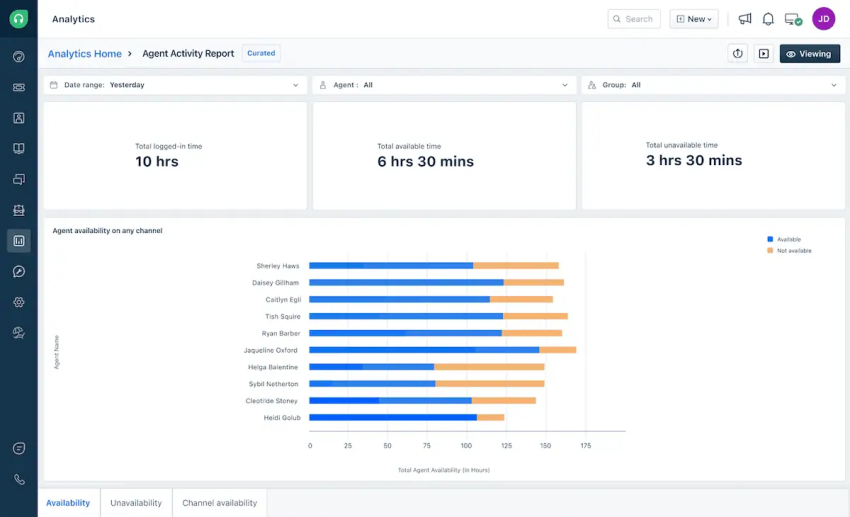
It features an intuitive interface that enables unlimited calling, voicemail, video conferencing, and team messaging at a reasonable price.
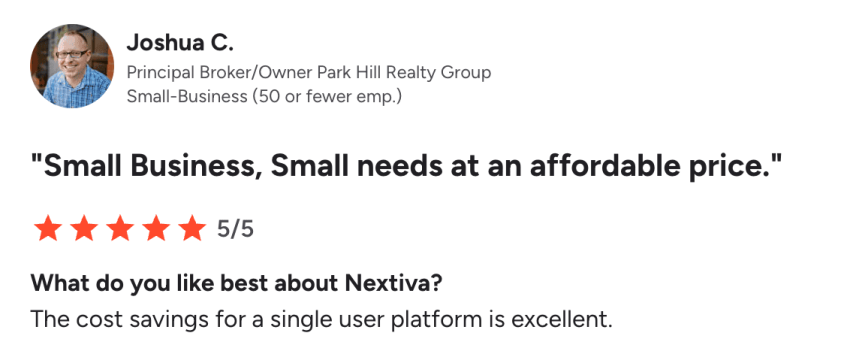
Below are some of the features that help Nextiva stand out:
- Unlimited calls within the US/Canada: All Nextiva plans offer unlimited domestic calling (and inexpensive international rates), so you don’t have to worry about per-minute charges for typical business calls.
- Intelligent IVR and call routing: Nextiva supports advanced call-routing strategies that enable you to set up multi-level IVR menus. You get features like skill-based routing, which intelligently routes calls to the right person or team based on business hours or caller input.
- Real-time dashboards and analytics: Gives real-time and historical stats on call volumes, durations, hold times, missed calls, and team performance metrics. This helps managers optimize service levels and staffing in call centers.
- Mobile app and web softphone: Enables employees to make or receive calls, send SMS messages, and participate in video meetings on their mobile device or laptop.
- Award-winning support and 99.999% uptime: Nextiva offers a 99.999% uptime service level agreement, demonstrating its exceptional reliability. It has built a reputation for excellent 24/7 customer support.
Best for:
Nextiva is best for small to mid-size businesses with distributed teams. If you’re highly focused on customer experience and are seeking an easy-to-use and scalable phone system with multiple features, Nextiva’s VoIP will suit your business.
2. RingCentral
RingCentral offers a cloud phone system combined with team messaging (chat), video conferencing, and integrations. With RingCentral, you get enterprise-grade reliability and a wide range of features. For example, several participants can join video meetings, and you get support for extensive file sharing and team collaboration tools in-app.

It also has a rich ecosystem of integrations with Microsoft 365, Google Workspace, Slack, and Salesforce. However, if you’re an entrepreneur, RingCentral may be a bit too advanced for your business needs. A user pointed this out in their G2 review, expressing that it would be easier to have a single point of contact for receiving assistance while navigating the software.
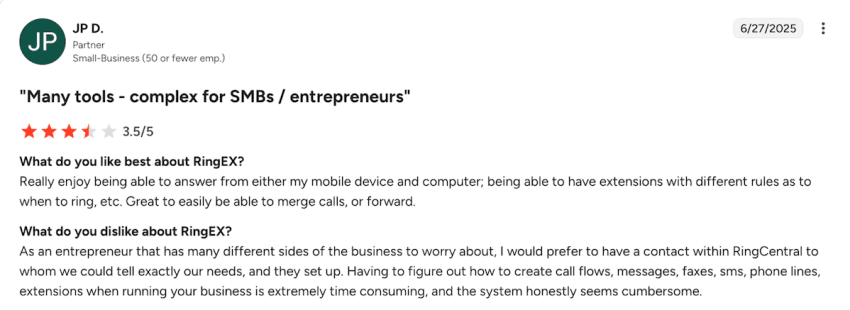
In response, the RingCentral team proactively addressed this on G2, encouraging small businesses and entrepreneurs to explore RingCentral University for their management and setup needs.
Best for:
RingCentral is ideal for mid-size to large businesses that want voice, SMS, fax, video, and team chat under one roof, while still having the flexibility to use a mix of devices. The product’s scalability and device support also make it suitable for enterprises with diverse needs or for those migrating from a legacy PBX while retaining existing phone hardware.
3. Dialpad
Dialpad offers a business communication system (Dialpad Connect) with a VoIP phone system as one of its functionalities. It delivers the usual calling, messaging, and video meetings, but what it really stands out for is its real-time AI transcription, sentiment analysis, and agent coaching tools.
As you talk, Dialpad transcribes the conversation on the screen and highlights action items. While it monitors sentiments, managers have the opportunity to join the live calls if they see that a conversation is going off track.
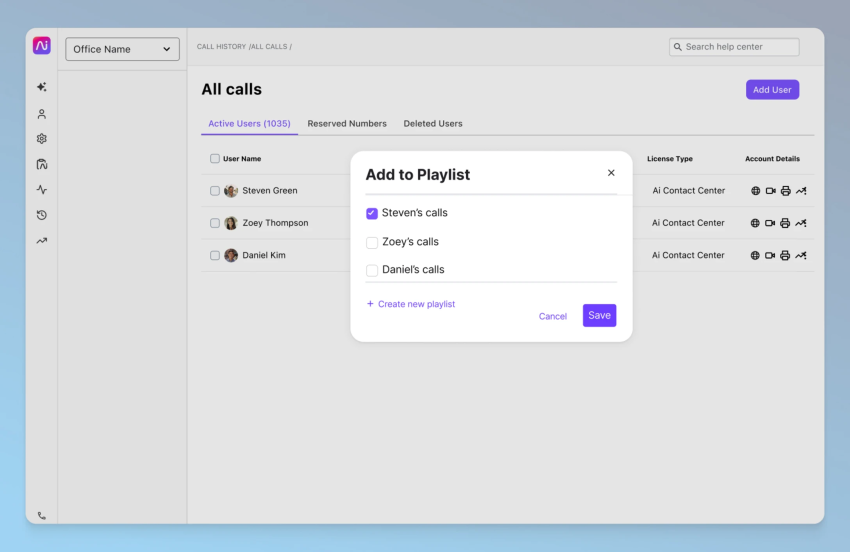
You get call summaries and notes after each conversation, sparing agents from manually taking notes. The platform also integrates with necessary tools, such as CRMs, to help synchronize customer data and maintain a single source of truth.
On review platforms, Dialpad is a popular choice among business VoIP service providers. Users have rated its features and customer service highly in their reviews.
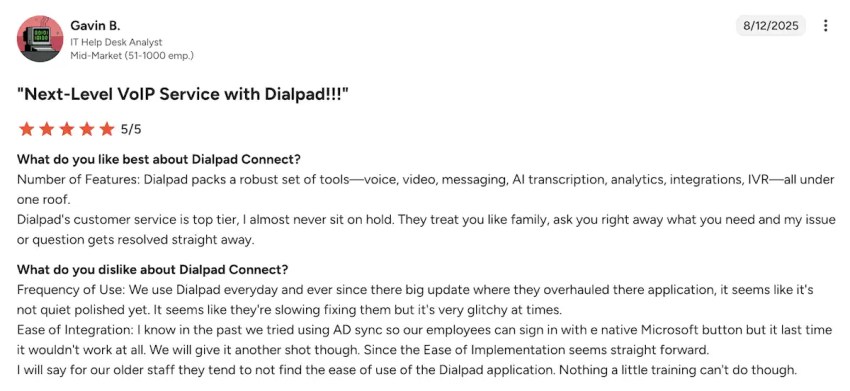
Best for:
Dialpad is ideal for organizations seeking AI-powered features to boost productivity in high-velocity call center operations. Ideally, companies that use Google or Microsoft productivity suites will find it easier to bring Dialpad into their workflow.
4. 3CX
A unique offering on this list, 3CX can be self-hosted or used via a partner’s cloud. You can use it on-prem on your own Windows or Linux server, making it a popular choice for businesses that need the flexibility of an open-platform PBX without being tied to a single hosted provider.
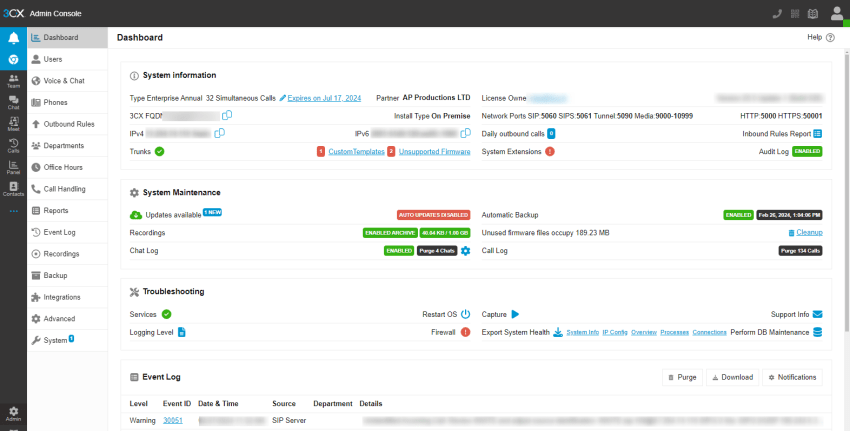
Technically, it’s not open source, but it offers a similar level of freedom, as you can use any SIP trunks, and the platform supports several SIP phones. It includes several useful features, such as IVR, ring groups, call queues, and built-in video conferencing.
For small businesses, 3CX offers a free edition, 3CX SMB, for one to 10 users. However, as you scale, the pricing becomes a little complicated.
Best for:
For tech-savvy IT departments expecting complete control over their phone system, 3CX is a good choice. It’s ideal for businesses that have IT resources to host their system on-prem.
5. 8×8
For businesses with an international footprint, 8×8 shines, as it includes unlimited calling to various countries. This allows enterprises to slash pricing when they have significant international calling needs. You also get features like HD video calls, team chat, SMS, IVR, and auto-dialers.

The platform offers an omnichannel solution, enabling you to manage SMS, web chat, voice calls, and social media messages all through a single system. Here’s how people feel about 8×8 after using it.
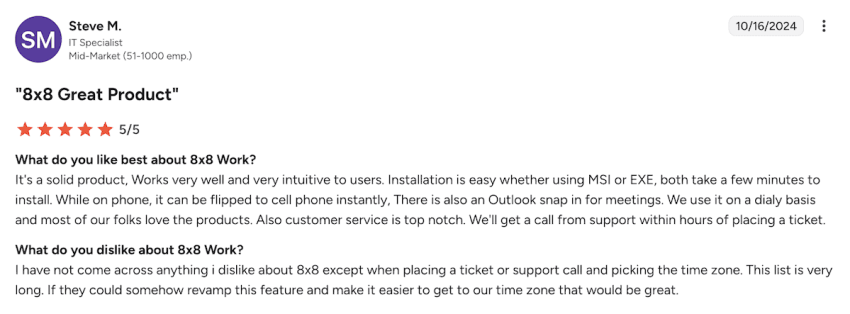
HIPAA compliant, 8×8 takes care of security. It provides an all-in-one unified communication platform capable of supporting a global customer base.
Best for:
If you have a multinational business with extensive international calling needs, 8×8 is a suitable VoIP solution.
6. CloudTalk
CloudTalk delivers a cloud-based phone system for power dialing and campaign management. It caters to the needs of sales teams and outbound calling, providing the functionality of intelligent dialers like power dialers and predictive dialers to call through your contact list automatically.
It features voicemail detection, which helps save time. The system also provides real-time metrics during calling campaigns, allowing managers to view live dashboards of calls made. You get global phone number coverage for international outbound dialing, while the prospects see a number that looks local. This increases connection rates, as call recipients are familiar with the mobile phone number sequences and country code.
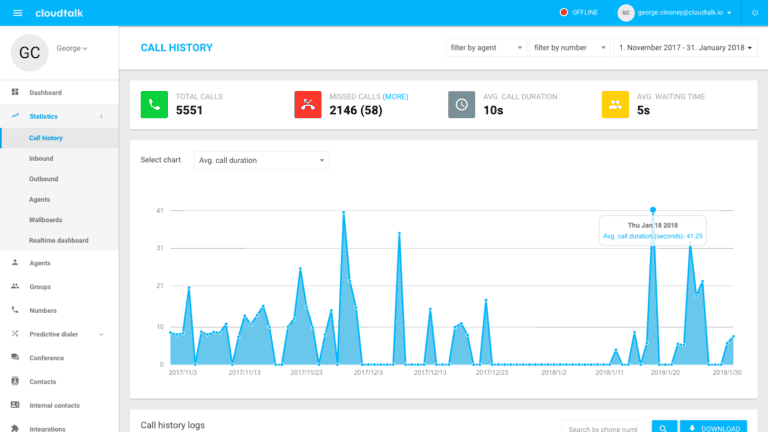
With CloudTalk, you gain multiple call center features, including IVR menus, call queues, skill-based routing, and call recording.
Best for:
CloudTalk is best for outbound sales, telemarketing, and any business that runs call campaigns. It’s a suitable solution for those who need a sales-first phone system.
7. Grasshopper
Grasshopper is different from most of the other products on this list. It’s a virtual phone system designed for small businesses, solo entrepreneurs, and freelancers who require a professional phone presence without the complexity of a complete VoIP PBX.
Grasshopper adds a business number on top of your existing mobile or landline phone. If you’re flying solo or have a small budget, this is a suitable service to keep your personal and business calls separate.
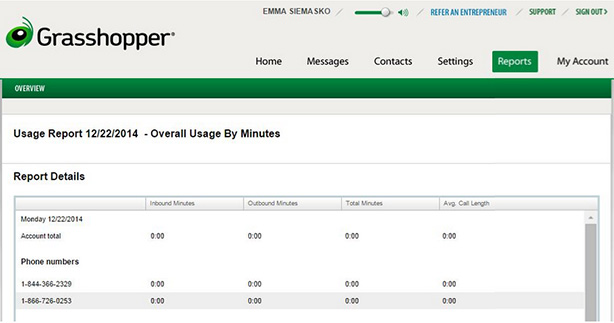
When you get inbound calls, the platform forwards them to your regular phone based on set rules. Similarly, you can use the Grasshopper mobile app or desktop app to make outbound calls. The recipients will see the business caller ID. In this service, you get an automated attendant that greets callers with a custom message and routes calls by extension or department. The solution supports call screening, business texting, and customer hold music.
Despite its lightweight advantage, users have expressed concerns over call drops, app freezes, and customer service.
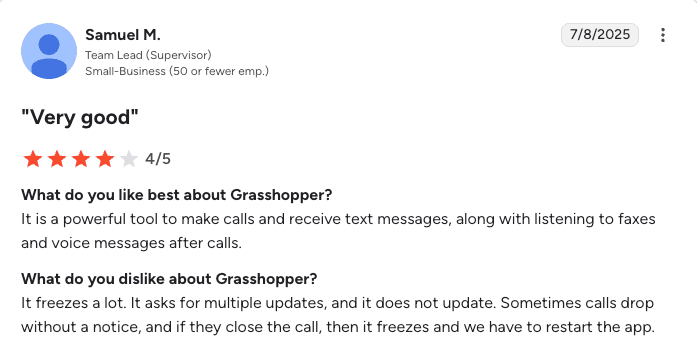
Best For:
Grasshopper is ideal for freelancers, consultants, startups, and small businesses that require a professional yet straightforward phone system. It’s not a completely unified communications platform, but it serves the basic phone needs of a small team.
8. Avaya Cloud Office
Avaya Cloud Office provides a fully featured unified communications platform that is implemented and managed on-prem. The platform offers features like call recording and call analytics, and it enables businesses to add real-time call center agent seats and dashboards, facilitating efficient call handling.
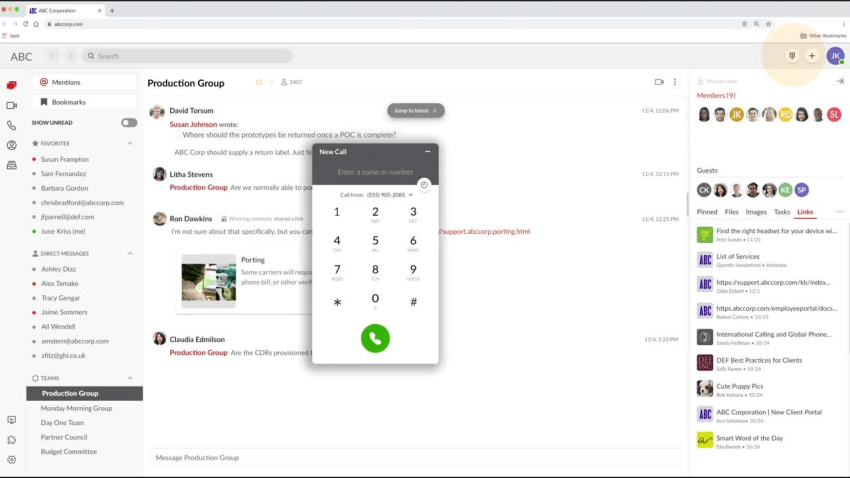
The platform empowers remote and mobile employees to work from anywhere while keeping everyone connected.
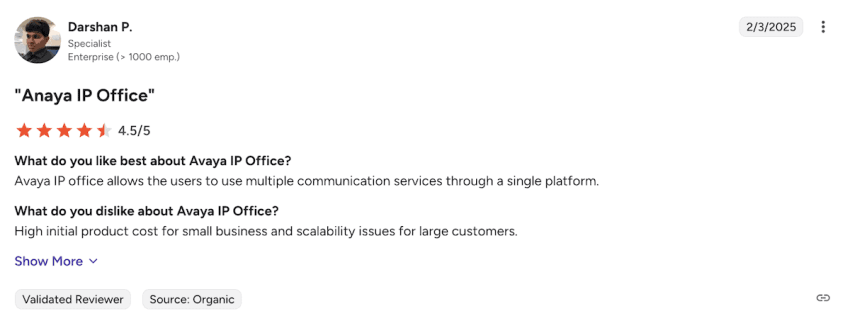
Best for:
It’s suitable for any organization seeking an all-in-one communication and collaboration suite. However, it’s appropriate for large businesses as there’s a high initial cost involved.
9. GoTo Connect
GoTo Connect is a cloud VoIP and unified communication service. It offers an intuitive web interface that helps admins build and modify call routing flows by dragging blocks and drawing connections. Designing call handling rules is easier with this service than with traditional PBX programming.

You get various features, including auto attendant, call queues, and different collaboration tools. The platform offers various contact center features, including call monitoring and wallboards. If you’re already in the GoTo ecosystem (with GoTo Webinar, etc.), it’s easy to streamline things by integrating the services you use.
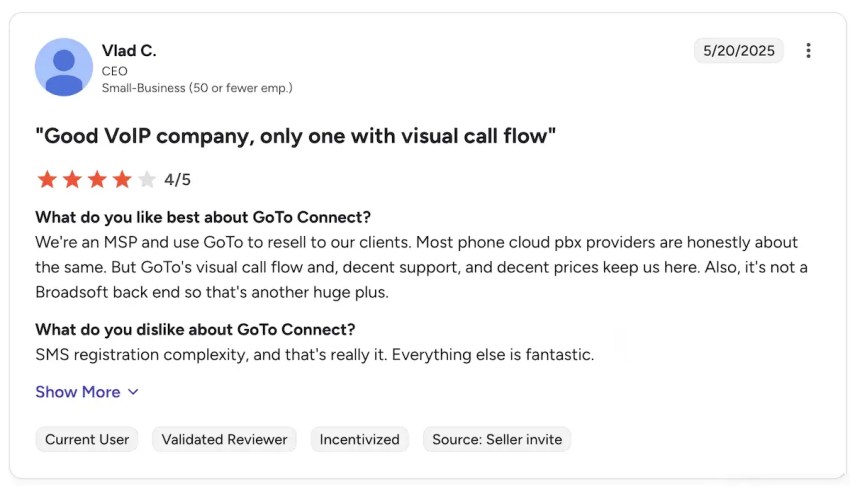
Best For:
It’s suitable for businesses that prioritize easy administration and custom call routing. For companies that prioritize IVR-driven self-service, GoTo Connect would be highly appealing.
10. Vonage
Vonage’s business communication platform delivers a cloud phone with voice, text, and video meetings functionality. The base plan of Vonage comes with several necessary features. However, many features require à la carte upgrades. These extra options typically range from approximately $4.99 to $49.99 per month and include features such as call recording and an AI virtual assistant.
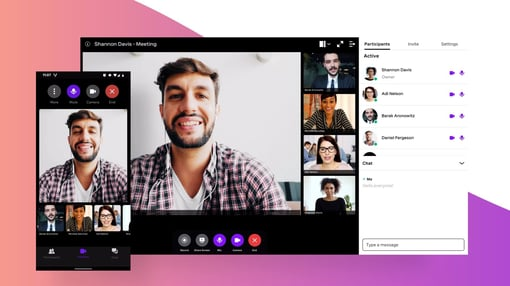
You can customize Vonage to your exact needs and budget, as you only pay for what you truly use. However, the advertised base price can increase once you add the necessary features for full parity with other providers.
Overall, Vonage is easy to use and implement, but the cost can be a point of consideration if you’re a lean business. Here’s similar feedback from one of its users:
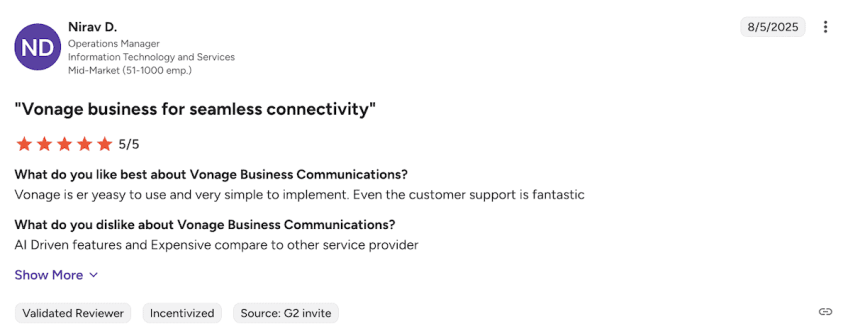
Best for:
The Vonage business communication system is ideal for mobile-first teams that require high flexibility in configuring their phone system. Small and mid-size businesses would benefit from it, as they would be able to gradually expand their functionality with add-ons. However, the costs would climb accordingly.
Considering VoIP? Nextiva Is a Strong Choice
Among the VoIP options on the market, Nextiva stands out due to its combination of simplicity, scalability, and a strong focus on customer experience. In addition to replacing phone lines, it upgrades your communication strategy, giving you an all-in-one platform to manage omnichannel interactions.
The platform features intelligent automation and AI insights, enabling you to analyze customer sentiment and satisfaction in real time. It empowers you to take action when it’s most crucial. The platform integrates seamlessly with systems you already use, maintaining a single source of truth for decision-making related to customers or your team.
Give your business the support it deserves from a flexible phone system. If you’re ready to finalize, learn how to set up VoIP phone service in your business.
Try a Nextiva demo. It guarantees 99.999% uptime and streamlined customer support.
The easiest phone system for businesses to use. Fast setup.
Get a professional phone system without the complexity. Enjoy crystal-clear calls and top features in record time.


















 VoIP
VoIP 

